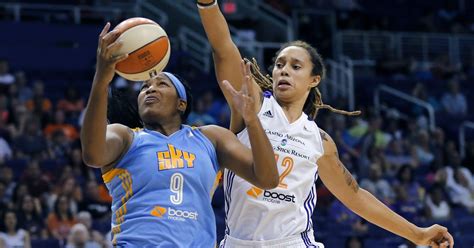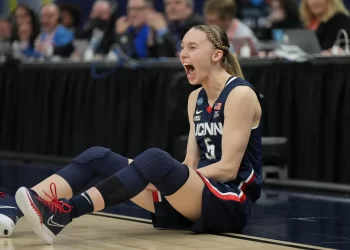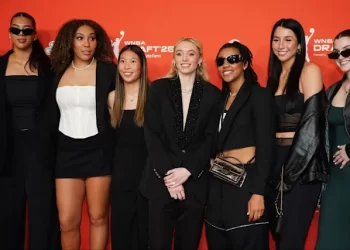By Jeffrey Newholm
Imagine it’s the morning of your first pro basketball game. After two decades of hard athletic training, the bright lights will shine on your greatest accomplishment. So what did Brittney Griner do the morning of her first WNBA game? According to the woman herself in her memoir, In My Skin, “I did what I always do when my alarm goes off: I hit the snooze button two or three times” (p. 3). But the book is no snooze. Griner offers a refreshingly candid and poignant account of her life and the state of women’s basketball. And even those who don’t think too highly of her (and you know who you are!) can hopefully gain a better understanding from looking at sports through the eyes of one of America’s extremely unique athletes.
Childhood
The first 50 pages detail Griner’s difficult upbringing in Houston. She struggled with anger and her sexuality, eventually leading to a frayed relationship with her demanding and controlling father. But it was the internet, paradoxically a tool often used to spread homophobia and hate, that gave Griner a sense of authenticity. She discovered, “I knew, from the first afternoon I spend reading about the LGBT community, I was reading about myself, that there were many other people out there like me. I was not alone, and the knowledge of that soothed some of my pain” (40). It’s interesting that she only devotes a quarter of the book to this memorable struggle, however. Perhaps when meaning in life is found in early adulthood childhood pain becomes a less meaningful footnote.
Basketball/Baylor
It’s not too surprising an eventual 6′ 8″ woman would succeed in basketball. But Griner’s current success is preceded by years of determined and uneven progress. 2018 WNBA contemporary Liz Cambage voices a complaint raised by Griner long ago, and currently relevant with Serena William’s US Open confrontation. Griner defends herself against controversy over her infamous college punch. She argues, “I don’t buy the idea that female athletes need to be nice and ladylike on the court. The heat of competition burns just as hot for a women as it does for a man” (87). And aggressive opponents were far from the only issue while playing for the Lady Bears.
Even though Griner’s sexuality has never really been a secret, Baylor seemed willing to use her for wins while unfairly singling her out. In fact Griner even quotes the student handbook which laughably (in a sad way) advises gay students to “avail themselves of opportunities for serious, confidential discussion, and support through the Spiritual Life Office” (p. 114). Griner portrays coach Kim Mulkey as willing to put on a happy face for the cameras (literally on draft day) while holding her to a double standard. Griner does write that “there is no right side or wrong side when it comes to Kim and me, just a lot of complicated feelings” (p.184). But with her disclaimers limited to a sole concluding page it appears it’s only with the benefit of hindsight she came to appreciate the positives of her college career beyond her extremely positive win-loss record.
WNBA
While some Americans moan of glory days in tiring jobs, Griner was elated with the switch to pro ball. She states, “I love the freedom of being a pro. I’m in charge of me now. Yes, more freedom also means more responsibility, but I’m learning how to handle it, even if the lessons are more expensive”. Her memorable welcome-to-the-league moment came when, sickened from rare steak, she was still able to hit a playoff series clincher. A memorable lesson for all is her discovery that “people sometimes perform their best when facing extra hurdles–like when I ran the timed mile in my Vans” (208). See, even pro athletes have morning laziness!
Of course we all should know that not every story has a happy ending. After the 2014 publication of her book, Griner’s reputation took a major hit. Her short-lived marriage to Glory Johnson resulted in a conflict and seven game suspension. This gave detractors another “aha!” zinger to demean Griner and her sport. Griner argues such comments can’t just be ignored: “People are always attacking women’s sports, especially women’s basketball, calling us inferior, comparing us to men, trying to knock us down […] But sometimes it feels like people within women’s sports don’t want to talk about it in public. They just want to put a happy, smiley face on everything (look how far we’ve come!), as if ignoring the sexism and the racism and the homophobia will somehow make it less of a problem” (129). And that’s where her story must resume today.
Contemporary Relevance
By my estimation, Griner seems to be more subdued today. She rarely makes publicized comments and quietly accepts B.S. ejections stemming from flops. However, her pro peers are more outspoken than ever. Cambage leads dozens of players who demand better pay, travel, and marketing. (Griner addresses typically terrible marketing when she is shown revealing uniforms). Every drop of water impacts the entire pool, and every fan makes an important choice. Together, fans can join WNBA athletes and many NBA supporters and hasten a current of improvement. And it’s a rewarding choice to make. There are enough snide “stay in the kitchen” cooks to spoil the broth, but Griner demonstrates that women’s hoops is a fulfilling banquet for even the most troubled souls.


 NFL
NFL






